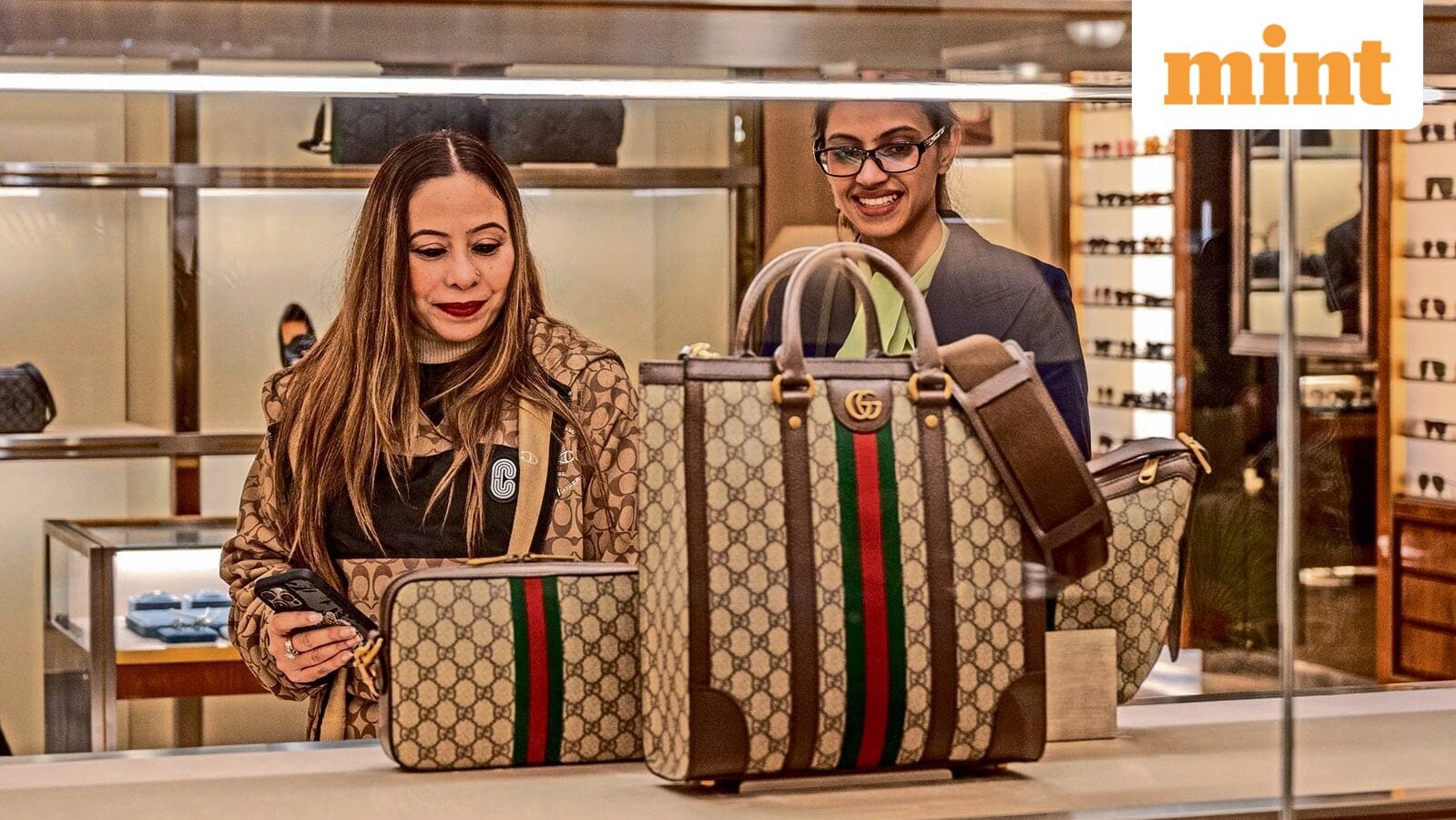Personal shoppers are trained retail professionals or stylists who assist customers in selecting and styling their clothing. Unlike regular store staff, they suggest new styles and mix outfits, making buyers more confident about their purchases. This not only enhances the brand experience but also sets it apart from its peers.
Shoppers Stop Ltd is one of the few multi-brand retailers that offer this service to all customers who walk into its stores. “The average transaction value of customers guided by personal shoppers is approximately ₹15,500,” said chief executive officer Kavindra Mishra in the June 2025 earnings call. The service generated ₹273.5 crore of the total ₹1,094 crore revenue during the quarter. Or 25% of the total sales, with the contribution rising by 7 percentage points from a year earlier.

View Full Image
The trend reflects a broader shift in India’s retail sector towards experience-driven, curated consumption after the pandemic. And it is closely linked to India’s wedding market, estimated at about ₹10 lakh crore (around $130 billion) in 2024-2025, making it the second-largest consumption category in the country after food and grocery, according to Jefferies. The market, fuelled by 8–10 million weddings annually, is expected to grow at an annualised rate of 14% through 2030.
“Premium products now account for 42% of FMCG value growth, despite making up just 27% of sales,” said Anand Ramanathan, partner and consumer industry leader at Deloitte India. “64% of consumers base apparel and footwear purchases on trends and events, with occasion-based fashion becoming a dominant driver.”
Several macroeconomic factors are reinforcing this change, he said, citing easing inflation and policy rates that have boosted consumer confidence. As discretionary spending grows, shoppers, especially millennials and Gen Z, are seeking personalised experiences, rather than purely transactional interactions, particularly in high-involvement categories such as fashion, beauty, and gifting, he said.
Shoppers Stop is aggressively expanding the personal shopper service, the management said in its June 2024 earnings call. The company said at the time that it plans to increase the number of personal shoppers from 300 to 500 as the service boosts the average transaction value per customer by three times.
Shoppers Stop didn’t respond to emailed queries on how many personal shoppers it has now.
“Customer retention is an important driver for store profitability. Personal shoppers offer personalised attention to repeat customers, resulting in higher sales and loyalty levels. Consumers are willing to pay for the convenience and shopping experience provided by personal shoppers,” said Ramanathan.
Demand spikes during weddings
DLF Luxury Malls was an adopter of the concept.
The personal shopper service first introduced in 2017 at New Delhi’s DLF Emporio as part of its commitment to “offering elevated, experience-led retail”, said Saurabh Barara, senior vice-president at DLF Luxury Malls. Since then, he said, it has gained steady traction, particularly during the festive and bridal seasons, becoming a “preferred touchpoint for discerning shoppers seeking a seamless retail journey”.
Unlike Shoppers Stop, Emporio offers it as an appointment-only service across multiple luxury brands within the mall. “The service includes pre-styled options, private trials, and one-on-one consultations. Every detail is designed to reflect the client’s lifestyle, personal preferences, and occasion,” Barara said.

View Full Image
Demand typically spikes during wedding trousseau curation, Diwali shopping, milestone celebrations, and international travel months, with clients frequently seeking guidance on luxury apparel, jewellery, fine watches, accessories, and gifting. According to Barara, customers using this service have higher ticket sizes and stronger repeat patronage. Currently, 5–7% of Emporio’s overall sales come through personal shoppers.
Designers, too, are seeing this shift reshape clients’ approach to fashion.
Gururam-based Bhawna Rao, who runs her own couture label, said the brand introduced personal shopper services from the very beginning to redefine luxury retail and create a space where women could indulge in a curated shopping experience that was not only opulent but also deeply personal and comfortable. She said the service operates in a hybrid format, with one-on-one styling sessions available both in-store and virtually, ensuring every client receives the same level of exclusivity and attention.
Rao said the service is especially popular among brides-to-be, their families, and high-net-worth clients, who spend significantly more per visit, often purchasing multiple gowns or complete looks, and return for subsequent events. Personal shoppers are a core driver of the brand’s revenue, contributing around 50–70% to the total, she said.
Multi-brand luxury fashion retailer Aza, which works with over a thousand designers across India, has integrated personal shopper services into both its online and offline formats.
The idea stemmed from the complexity of shopping for designer wear, especially during weddings, said Devangi Parekh, co-founder of Aza.
“People who are shopping really do need that one-on-one service, comfort, guidance in terms of finding their dream outfit,” she said. “When we started, there weren’t a lot of options available in terms of guidance for customers, so our personal shoppers have been there across all the years of our shop.”
The retailer offers free styling support, tailored to each client’s budget, body type, and occasion, Parekh said. “It’s not just about the bride or groom—bridesmaids, family members, and guests also need wardrobes curated across multiple events, from traditional ceremonies to modern receptions. We help them find the right designer, silhouette, and accessories for each look.”
Aza’s service is fully in-house, with trained stylists accessible across its 12 stores, and through its website and app, where customers can connect to a stylist via call or video. “We don’t outsource because that’s our USP. Whether online or offline, we ensure the highest quality of service,” Parekh said, adding that demand peaks during weddings and festive seasons such as Diwali, where customers often plan wardrobes for weeks of events.
While personal shopping was once viewed as an exclusively luxury offering, it is increasingly becoming mainstream, she said. “It’s about working with your customer and providing something above and beyond. It makes sense for any multi-brand retailer, not just luxury ones.”
Specialized platforms
The success of personal shoppers has also spawned independent platforms offering this service.
Style Buddy, founded by Jyoti Meera, offers personal shopping, wardrobe management, and consulting, charging clients between ₹5,000 and ₹20,000 per session. The company has partnered with brands like Manyavar, trained store staff and deployed stylists.
“We assist in malls or stores depending on the client’s requirement, and help them find the best outfit according to their body type, skin tone, and budget,” Meera said. “Our stylists are able to close a minimum of ₹60,000 to ₹1 lakh in sales per day.”
Shop-In, a Hyderabad-based personal shopper platform, co-founded by Shashank Veer Poddaturi, runs on a freelance model where shoppers are booked online. Customers pay a 4195 reservation fee and 15% of the total purchase value.
“We started as a service helping Indians abroad shop from local markets, but pivoted to personal shopping as we saw demand from tier-II and tier-III cities to shop in metros like Hyderabad or Delhi,” Poddaturi said.
The platform currently handles around 300 orders a month, from couture buys to niche requests such as artificial flowers or industrial parts, according to Poddaturi. “If you have someone replicating you at the store, then I think all the problems are solved for you.”
#Styleconscious #Indian #shoppers #musthave #personal #shoppers



